一般过去时态精讲精练
- 格式:doc
- 大小:47.00 KB
- 文档页数:3
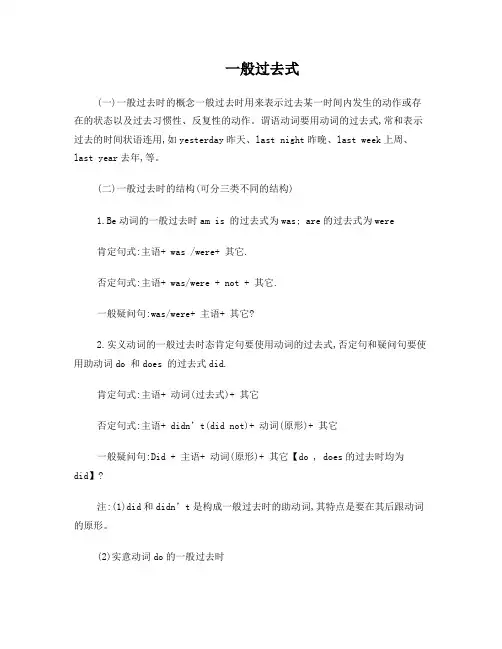
一般过去式(一)一般过去时的概念一般过去时用来表示过去某一时间内发生的动作或存在的状态以及过去习惯性、反复性的动作。
谓语动词要用动词的过去式,常和表示过去的时间状语连用,如yesterday昨天、last night昨晚、last week上周、last year去年,等。
(二)一般过去时的结构(可分三类不同的结构)1.Be动词的一般过去时am is 的过去式为was; are的过去式为were肯定句式:主语+ was /were+ 其它.否定句式:主语+ was/were + not + 其它.一般疑问句:was/were+ 主语+ 其它?2.实义动词的一般过去时态肯定句要使用动词的过去式,否定句和疑问句要使用助动词do 和does 的过去式did.肯定句式:主语+ 动词(过去式)+ 其它否定句式:主语+ didn’t(did not)+ 动词(原形)+ 其它一般疑问句:Did + 主语+ 动词(原形)+ 其它【do , does的过去时均为did】?注:(1)did和didn’t是构成一般过去时的助动词,其特点是要在其后跟动词的原形。
(2)实意动词do的一般过去时I do my homework every day.(用yesterday改写句子)I did my homework yesterday.I didn’t do my homework yesterday.(否定句)Did you doyour homework yesterday?Yes ,I did. /No, I didn’t.(一般疑问句)3. 情态动词的一般过去时态肯定句式:主语+ 情态动词+ 其它否定句式:主语+ 情态动词+ not + 其它.一般疑问句:情态动词+ 主语+ 其它?注:情态动词的过去式:can→could , may→might , must→must ,will-would,should-should。
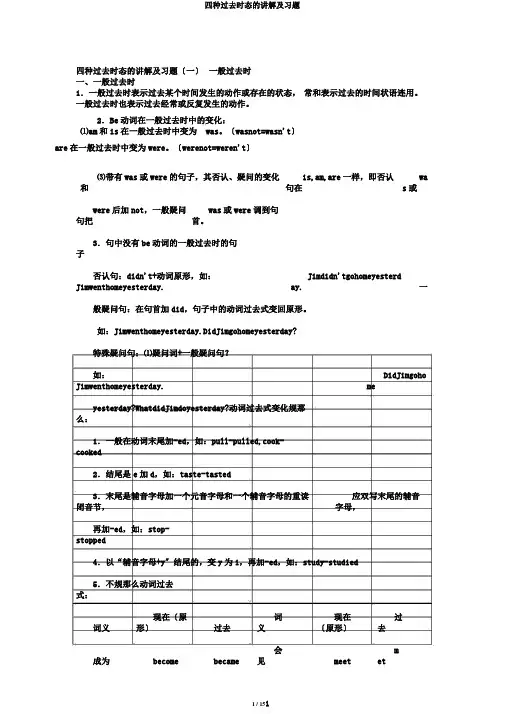
四种过去时态的讲解及习题〔一〕一般过去时一、一般过去时1.一般过去时表示过去某个时间发生的动作或存在的状态,常和表示过去的时间状语连用。
一般过去时也表示过去经常或反复发生的动作。
2.Be动词在一般过去时中的变化:⑴am和is在一般过去时中变为was。
〔wasnot=wasn't〕are在一般过去时中变为were。
〔werenot=weren't〕⑶带有was或were的句子,其否认、疑问的变化和is,am,are一样,即否认句在was或were后加not,一般疑问句把was或were调到句首。
3.句中没有be动词的一般过去时的句子否认句:didn't+动词原形,如:Jimwenthomeyesterday.Jimdidn'tgohomeyesterday.一般疑问句:在句首加did,句子中的动词过去式变回原形。
如:Jimwenthomeyesterday.DidJimgohomeyesterday?特殊疑问句:⑴疑问词+一般疑问句?如:Jimwenthomeyesterday.DidJimgoho meyesterday?WhatdidJimdoyesterday?动词过去式变化规那么:1.一般在动词末尾加-ed,如:pull-pulled,cook-cooked2.结尾是e加d,如:taste-tasted3.末尾是辅音字母加一个元音字母和一个辅音字母的重读闭音节,应双写末尾的辅音字母,再加-ed,如:stop-stopped4.以“辅音字母+y〞结尾的,变y为i,再加-ed,如:study-studied5.不规那么动词过去式:词义现在〔原形〕过去词义现在〔原形〕过去成为become became会见meetmet制造make made弯曲bendbent是are(be)were意味meanmeant躺lie lay开始beginbegan是am,is(be)was可以maymight飞fly flew忘记forgetforgot度过spend spent扫sweeps wept发现find found说speaks poke感觉feel felt睡觉sleepslept吃eat ate坐下sitsat饮drink drank唱歌singsang看见see saw将shalls hould说say said画drawd rew跑run ran做do,doesd id响、鸣ring rang来comec ame骑、乘ride rode切cutc ut捕捉catch caught选择choosechose能can could读readr ead买buy bought放置putput吹blow blew必须mustmust得到get got保持keep kept 给give gave知道know knew走go went学习learnlearned, learnt成长grow grew允许,让let let有have,has had受伤hurt hurt听hear heard4 一般过去时练习Be动词的过去时练习〔1〕一、用be动词的适当形式填空1.I_______atschooljustnow.2.He________atthecamplastweek.3.We________studentstwoyearsago.4.They________onthefarmamomentago.5.YangLing________elevenyearsoldlastyear.6.There________anappleontheplateyesterday.7.There________somemilkinthefridgeonSunday.8.Themobilephone_______onthesofayesterdayevening.二、句型转换1.Itwasexciting.否认句:________________________________________________一般疑问句:____________________________________________肯、否认答复:__________________________________________ thestudentswereveryexcited.否认句:________________________________________________一般疑问句:____________________________________________肯、否认答复:__________________________________________wereinhispocket.否认句:________________________________________________一般疑问句:____________________________________________肯、否认答复:__________________________________________Be动词的过去时练习〔2〕一、用be动词的适当形式填空1.I______anEnglishteachernow.2.She_______happyyesterday.3.They_______gladtoseeeachotherlastmonth4.HelenandNancy________goodfriends.5.Thelittledog_______twoyearsoldthisyear.6.Look,there________lotsofgrapeshere.7.There________asignonthechaironMonday..8.Today_______thesecondofJune.Yesterday______thefirstofJune.It_____Children'sDay. Allthestudents______veryexcited.二、句型转换1.Therewasacarinfrontofthehousejustnow.否认句:________________________________________________一般疑问句:____________________________________________三、中译英我的故事书刚刚还在手表旁边。
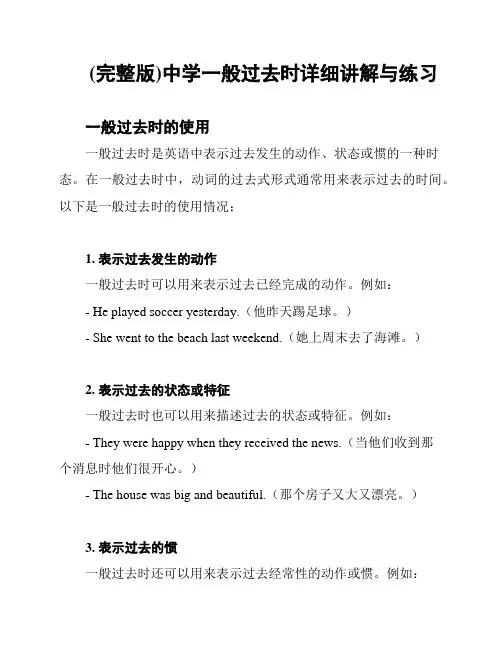
(完整版)中学一般过去时详细讲解与练习一般过去时的使用一般过去时是英语中表示过去发生的动作、状态或惯的一种时态。
在一般过去时中,动词的过去式形式通常用来表示过去的时间。
以下是一般过去时的使用情况:1. 表示过去发生的动作一般过去时可以用来表示过去已经完成的动作。
例如:- He played soccer yesterday.(他昨天踢足球。
)- She went to the beach last weekend.(她上周末去了海滩。
)2. 表示过去的状态或特征一般过去时也可以用来描述过去的状态或特征。
例如:- They were happy when they received the news.(当他们收到那个消息时他们很开心。
)- The house was big and beautiful.(那个房子又大又漂亮。
)3. 表示过去的惯一般过去时还可以用来表示过去经常性的动作或惯。
例如:- I always ate breakfast before going to school.(我过去上学前总是吃早餐。
)- She often went for a run in the evening.(她过去经常在晚上去跑步。
)一般过去时的构成与规则动词变化- 对于大多数动词,一般过去时的构成是在动词原形后面加上-ed。
例如:play → played, work → worked。
- 对于以e结尾的动词,只需要加-d。
例如:live → lived。
- 对于以辅音字母+y结尾的动词,将y变为i然后加-ed。
例如:study → studied。
- 对于以辅音字母结尾的重读闭音节动词,重读闭音节的辅音字母要双写,再加-ed。
例如:stop → stopped。
- 一些动词的过去式形式是不规则的,需要特殊记忆。
例如:go → went, eat → ate。
一般过去时的练以下是一些练,帮助你巩固一般过去时的使用和动词形式变化:1. Fill in the blanks with the correct past tense form of the verbs:- She __________ (watch) a movie last night.- They __________ (visit) their grandparents on the weekend.- He __________ (study) math for two hours yesterday.2. Rewrite the sentences in the past tense:- I go to school every day. (改为过去时)- Jane plays tennis on Saturdays. (改为过去时)- We eat pizza for lunch. (改为过去时)- She __________ (go/went) to the party last night.- We __________ (see/saw) a movie at the cinema.- He __________ (run/ran) in the race and won.请根据上述讲解和练习进行学习和练习,巩固中学一般过去时的用法和动词形式变化。
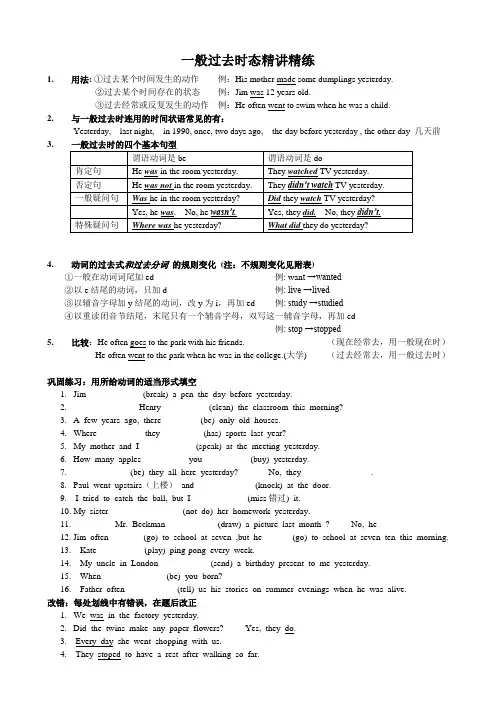
一般过去时态精讲精练1. 用法: ①过去某个时间发生的动作例:His mother made some dumplings yesterday.②过去某个时间存在的状态例:Jim was 12 years old.③过去经常或反复发生的动作例:He often went to swim when he was a child.2. 与一般过去时连用的时间状语常见的有:Yesterday, last night, in 1990, once, two days ago, the day before yesterday , the other day 几天前4. 动词的过去式和过去分词的规则变化(注:不规则变化见附表)①一般在动词词尾加ed 例: wan t →wanted②以e结尾的动词,只加d 例: live →lived③以辅音字母加y结尾的动词,改y为i,再加ed 例: study →studied④以重读闭音节结尾,末尾只有一个辅音字母,双写这一辅音字母,再加ed例: stop →stopped5. 比较:He often goes to the park with his friends. (现在经常去,用一般现在时)He often went to the park when he was in the college.(大学) (过去经常去,用一般过去时)巩固练习:用所给动词的适当形式填空1. Jim ___________ (break) a pen the day before yesterday.2. _______________Henry _________ (clean) the classroom this morning?3. A few years ago, there _______ (be) only old houses.4. Where _________ they ________ (has) sports last year?5. My mother and I ___________ (speak) at the meeting yesterday.6. How many apples __________you _________ (buy) yesterday.7. ------________ (be) they all here yesterday? ------No, they _______________.8. Paul went upstairs(上楼)and ____________ (knock) at the door.9. I tried to catch the ball, but I ____________(miss错过) it.10. My sister _______________ (not do) her homework yesterday.11. ________ Mr. Beckman __________ (draw) a picture last month ? ------No, he ____________12. Jim often _______(go) to school at seven ,but he ______(go) to school at seven ten this morning.13. Kate _________ (play) ping-pong every week.14. My uncle in London __________ (send) a birthday present to me yesterday.15. When _____________ (be) you born?16. Father often __________ (tell) us his stories on summer evenings when he was alive.改错:每处划线中有错误,在题后改正1. We was in the factory yesterday.2. Did the twins make any paper flowers? ------Yes, they do.3. Every day she went shopping with us.4. They stoped to have a rest after walking so far.5. They didn’t went on a picnic last week.6. What did they made last Sunday.7. She was went to school early yesterday.8. The students were make many paper kites yesterday afternoon.9. Who did went to the park yesterday?10. She reads the book yesterday and listened to the radio.写出下列动词的过去式和过去分词(规则变化)relax ______________ kill ______________ dance _______________ watch _______________ study ______________ travel ______________ stop_______________ play _______________按要求句型转换:Jim was at home yesterday. Kate went to the park last week.否定句:___________________________ _________________________________一般疑问句:_________________________ _________________________________两回答:____________________________ _________________________________特殊疑问句:________________________ _________________________________巧记不规则动词过去式1.中间去e,末尾加t 如:keep→kept,feel→felt,sleep→slept,sweep→swept2.结尾d变t 如:build→built,lend→lent,send→sent,spend→spent3.遇见i改为a 如:ring→rang,sit→sat,drink→drank,sing→sang,swim→swam,begin→began,give→gave4.“骑(马)”“开(车)”“写(字)”——把i变o如:ride→rode,drive→drove,write→wrote5.“想”“买”“带来”“打仗”——ought换上如:think→thought,buy→bought,bring→brought,fight→fought6.“教书”“抓住”——aught切莫忘如:teach→taught,catch→caught7.ow/aw改为ew是新时尚如:know→knew,grow→grew,throw→threw,draw→drew8.“放”“让”“读”过去式与原形一样如:put→put,let→let,read→read/red。
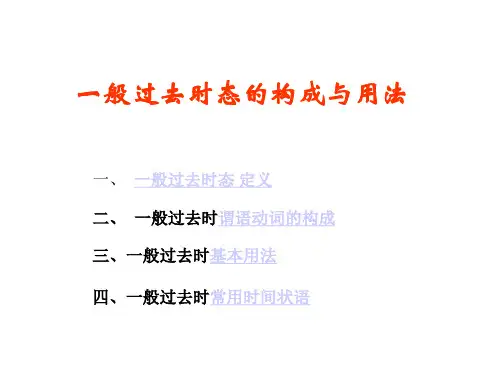
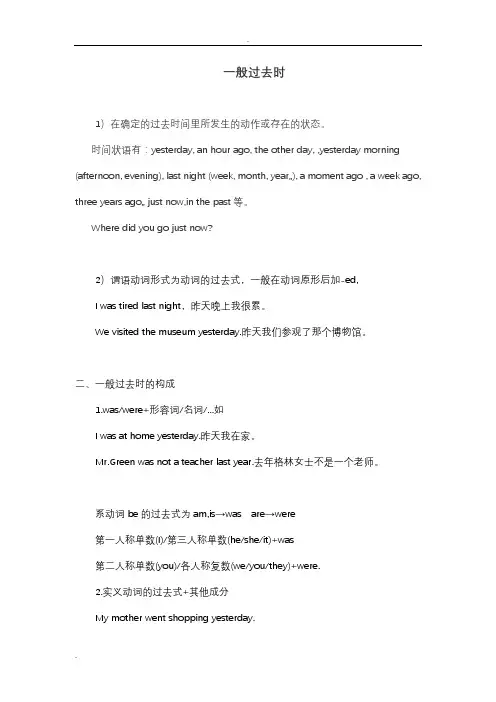
一般过去时1)在确定的过去时间里所发生的动作或存在的状态。
时间状语有:yesterday, an hour ago, the other day, ,yesterday morning (afternoon, evening), last night (week, month, year…), a moment ago , a week ago, three years ago… just now,in the past等。
Where did you go just now?2)谓语动词形式为动词的过去式,一般在动词原形后加-ed,I was tired last night,昨天晚上我很累。
We visited the museum yesterday.昨天我们参观了那个博物馆。
二、一般过去时的构成1.was/were+形容词/名词/...如I was at home yesterday.昨天我在家。
Mr.Green was not a teacher last year.去年格林女士不是一个老师。
系动词be的过去式为am,is→was are→were第一人称单数(I)/第三人称单数(he/she/it)+was第二人称单数(you)/各人称复数(we/you/they)+were.2.实义动词的过去式+其他成分My mother went shopping yesterday.我妈妈昨天去购物了。
His uncle worked in Beijing in 2014.他叔叔2014年在北京工作。
三、一般过去时的句式四、动词过去式的变化规则3 used toused to + do:"过去常常"表示过去习惯性的动作或状态,但如今已不存在。
Mother used to take a walk. (过去常常散步)二、构成及变化1. Be动词在一般过去时中的变化:am 和is在一般过去时中变为was。
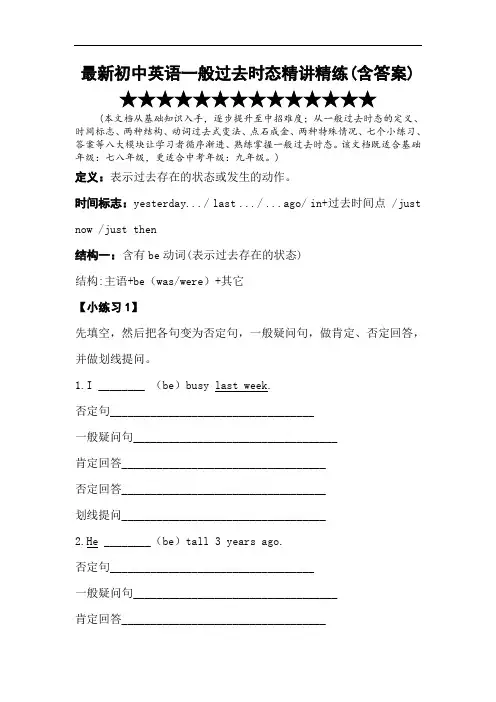
最新初中英语一般过去时态精讲精练(含答案) ★★★★★★★★★★★★★★
(本文档从基础知识入手,逐步提升至中招难度;从一般过去时态的定义、时间标志、两种结构、动词过去式变法、点石成金、两种特殊情况、七个小练习、答案等八大模块让学习者循序渐进、熟练掌握一般过去时态。
该文档既适合基础年级:七八年级,更适合中考年级:九年级。
)
定义:表示过去存在的状态或发生的动作。
时间标志:yesterday.../ last .../ ...ago/ in+过去时间点 /just now /just then
结构一:含有be动词(表示过去存在的状态)
结构:主语+be(was/were)+其它
【小练习1】
先填空,然后把各句变为否定句,一般疑问句,做肯定、否定回答,并做划线提问。
1.I ________ (be)busy last week.
否定句___________________________________
一般疑问句___________________________________
肯定回答___________________________________
否定回答___________________________________
划线提问___________________________________
2.He ________(be)tall 3 years ago.
否定句___________________________________
一般疑问句___________________________________
肯定回答___________________________________。
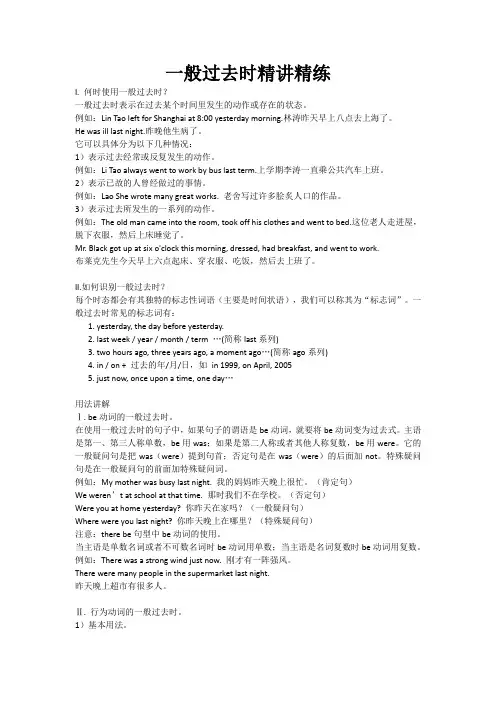
一般过去时精讲精练I. 何时使用一般过去时?一般过去时表示在过去某个时间里发生的动作或存在的状态。
例如:Lin Tao left for Shanghai at 8:00 yesterday morning.林涛昨天早上八点去上海了。
He was ill last night.昨晚他生病了。
它可以具体分为以下几种情况:1)表示过去经常或反复发生的动作。
例如:Li Tao always went to work by bus last term.上学期李涛一直乘公共汽车上班。
2)表示已故的人曾经做过的事情。
例如:Lao She wrote many great works. 老舍写过许多脍炙人口的作品。
3)表示过去所发生的一系列的动作。
例如:The old man came into the room, took off his clothes and went to bed.这位老人走进屋,脱下衣服,然后上床睡觉了。
Mr. Black got up at six o'clock this morning, dressed, had breakfast, and went to work.布莱克先生今天早上六点起床、穿衣服、吃饭,然后去上班了。
II.如何识别一般过去时?每个时态都会有其独特的标志性词语(主要是时间状语),我们可以称其为“标志词”。
一般过去时常见的标志词有:1. yesterday, the day before yesterday.2. last week / year / month / term …(简称last系列)3. two hours ago, three years ago, a moment ago…(简称ago系列)4. in / on + 过去的年/月/日,如in 1999, on April, 20055. just now, once upon a time, one day…用法讲解Ⅰ. be动词的一般过去时。
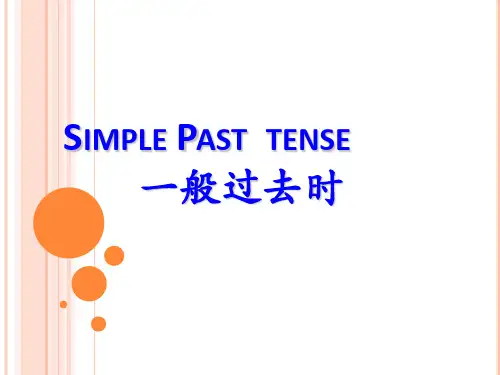
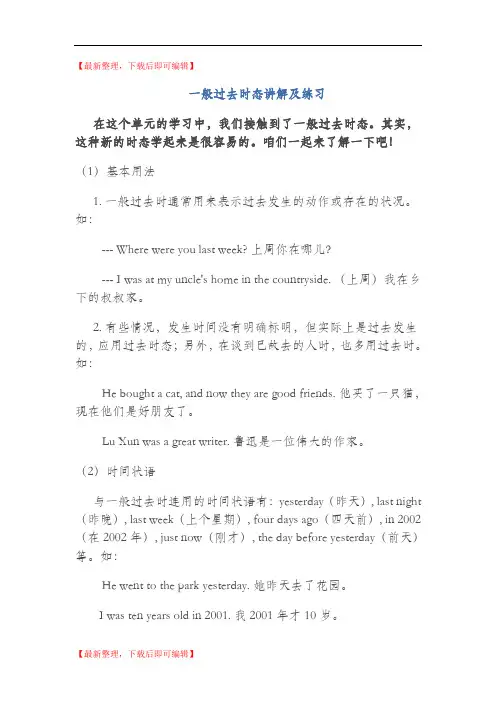
【最新整理,下载后即可编辑】一般过去时态讲解及练习在这个单元的学习中,我们接触到了一般过去时态。
其实,这种新的时态学起来是很容易的。
咱们一起来了解一下吧!(1)基本用法1. 一般过去时通常用来表示过去发生的动作或存在的状况。
如:--- Where were you last week? 上周你在哪儿?--- I was at my uncle's home in the countryside. (上周)我在乡下的叔叔家。
2. 有些情况,发生时间没有明确标明,但实际上是过去发生的,应用过去时态;另外,在谈到已故去的人时,也多用过去时。
如:He bought a cat, and now they are good friends. 他买了一只猫,现在他们是好朋友了。
Lu Xun was a great writer. 鲁迅是一位伟大的作家。
(2)时间状语与一般过去时连用的时间状语有:yesterday(昨天), last night (昨晚), last week(上个星期), four days ago(四天前), in 2002(在2002年), just now(刚才), the day before yesterday(前天)等。
如:He went to the park yesterday. 她昨天去了花园。
I was ten years old in 2001. 我2001年才10岁。
(3)动词的过去式在一般过去时态中会涉及到动词的过去式,大家要掌握规则动词的过去式的变化规则。
其基本的变化规则如下:①一般情况下,在动词原形后直接ed。
如:play –played , look –looked 。
②以e结尾的动词在其后加d。
如:like –liked, use –used。
③与辅音字母加y结尾的动词,把y变成i 再加ed。
如:carry – carried, marry - married。
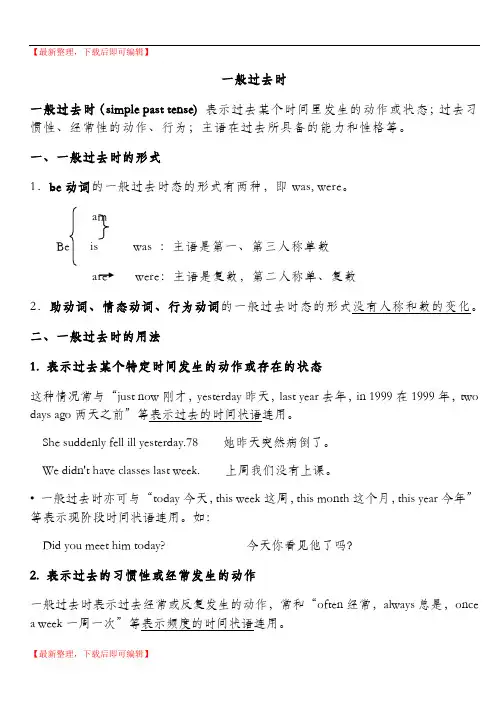
【最新整理,下载后即可编辑】一般过去时一般过去时(simple past tense) 表示过去某个时间里发生的动作或状态;过去习惯性、经常性的动作、行为;主语在过去所具备的能力和性格等。
一、一般过去时的形式1.be动词的一般过去时态的形式有两种,即was, were。
amBe is was :主语是第一、第三人称单数are were:主语是复数,第二人称单、复数2.助动词、情态动词、行为动词的一般过去时态的形式没有人称和数的变化。
二、一般过去时的用法1. 表示过去某个特定时间发生的动作或存在的状态这种情况常与“just now刚才,yesterday昨天,last year去年,in 1999在1999年,two days ago两天之前”等表示过去的时间状语连用。
She suddenly fell ill yesterday.78 她昨天突然病倒了。
We didn't have classes last week. 上周我们没有上课。
• 一般过去时亦可与“today今天,this week这周,this month这个月,this year今年”等表示现阶段时间状语连用。
如:Did you meet him today? 今天你看见他了吗?2. 表示过去的习惯性或经常发生的动作一般过去时表示过去经常或反复发生的动作,常和“often经常,always总是,once a week一周一次”等表示频度的时间状语连用。
I went to the cinema once a week when I was at school. 我上学时每周去看一场电影。
When I was in the countryside, I often walked by the riverside. 我在乡下时经常在河边散步。
• 表示过去一段时间内经常或反复发生的动作,也可以用would+动词原形或用used to加动词原形:When he was young, he would go skating every winter. 他年轻时每年冬天都要去滑冰。
(完整版)小学地理一般过去时讲解及练习一、什么是一般过去时一般过去时是描述过去发生的动作、事情或状态的时态。
在一般过去时中,谓语动词通常要加上了过去式(-ed)的形式。
二、一般过去时的使用方法1. 表示过去的动作或事件例如:- 上周末,我去了动物园。
- 昨天晚上他看了一部有趣的电影。
2. 表示过去的惯或经常性动作例如:- 我小时候常常去公园玩。
- 他过去每天都骑自行车上学。
3. 表示过去的状态或条件例如:- 他以前是个优秀的学生。
- 我们过去住在一个小村庄里。
三、一般过去时的构成方式一般过去时的肯定句构成方式为:主语 + 过去式谓语动词 + 其他成分。
例如:- They played baseball in the park.(他们在公园里打棒球。
)一般过去时的否定句构成方式为:主语 + did not + 原形动词 + 其他成分。
例如:- She did not watch TV last night.(她昨晚没有看电视。
)一般过去时的疑问句构成方式为:Did + 主语 + 原形动词 + 其他成分?例如:- Did he go to the zoo?(他去动物园了吗?)四、一般过去时的练题请根据下面的句子,选择正确的动词形式填入空格中。
1. We ____(play/played) tennis last Sunday.2. I ____(visit/visited) my grandparents yesterday.3. The cat ____(sleep/slept) all day yesterday.4. She ____(go/went) to the beach with her friends.5. They ____(watch/watched) a movie at the cinema last night.答案:1. played2. visited3. slept4. went5. watched注意:以上为简单练,供参考使用。
一般过去时一、一般过去时表示过去某个时间里发生的动作或状态;过去习惯性、经常性的动作、行为;过去主语所具备的能力和性格。
二、句子结构主语+did (动词过去式)主语+was/were三、基本用法用法示例表示过去发生的动作或状态My family had a picnic in the park last weekend.我们全家人上周末在公园有个野炊。
表示过去经常或反复发生的动作或状态When she was young, she usually went to the library toread books.当她小的时候,她经常去图书馆读书。
表示过去的情况或状态There was a small pound in the school before.之前学校这里有个小池塘。
知识精讲四、时间状语:1. yesterday, the day before yesterday2. 时间段+ago: three years ago, long ago…3. last: last day/ week/ year…4. in +过去年份: in 2015…5. just now 刚才五、一般过去时动词过去式的规则变化情况变形示例一般情况加-edwork-worked,listen-listened 以e字母结尾直接加-dlive-lived,receive-received“辅元辅”结构双写词尾辅音字母加-ed stop-stopped, chat-chatted以辅音字母加 y结尾变y为i 再加-ed study-studied 以元音字母加 y结尾直接加-ed enjoy-enjoyed六、一般过去时动词过去式的不规则变化变化类型示例A---A---A型cost cost cost 花费 hit hit hit 打(现在式、过去式和过去分词同形)cut cut cut 割,切read read read 读let let let 让put put put 放下A---A---B型beat beat beaten 打A---B---A型come came come 来、become became become 变、runran run 跑A ---B ---B型burn burnt burnt 燃烧learn learned/learntlearned/learnt学习build built built 建筑lose lost lost 失去lend lent lent 借给spend spent spent 花费pay paid paid 付lay laid laid 下蛋say said said 说bring broughtbrought 带来buy bought bought 买think thoughtthought 想sleep slept slept 睡keep kept kept 保持sweep swept swept 扫feel felt felt 觉得find found found 发现have had had 有get got got 得到hold held held 盛,握leave left left 离开make made made 制造meet met met 遇见sell sold sold 卖tell told told 告诉teach taught taught 教stand stood stood 站understand understood understood 明白catch caught caught 抓住sit sat sat 坐fly flew flown 飞A---B---C型eat ate eaten 吃fall fell fallen 落下give gave given 给take took taken 拿see saw seen 看见write wrote written写ride rode ridden 骑drive drove driven驾驶throw threw thrown抛,扔blow blew blown 吹grow grew grown 生长steal stole stolen 偷drink drank drunk 饮choose chose chosen 选择forget forgot forgotten 忘记begin began begun 开始ring rang rung 按铃sing sang sung 唱swim swam swum 游泳draw drew drawn 拉,绘画show showed shown 展示speak spoke spoken 说话break broke broken 破碎,折断know knew known 知道其他不规则动词的变化be(am, is) was/ werebeen 是go went gone 去lie lay lain 躺do did done 做wear wore worn 穿七、相关句式be动词行为动词用法主语是单数用was,复数则用were。
初中一般过去时精讲精练初中一般过去时讲解+练一般过去时表示过去某个时间发生的动作或存在的状态,或表示过去经常或反复发生的动作。
常与表示过去时间的状语连用。
基本用法:1.表示过去发生的动作或存在的状态。
例如:Where were you last week。
上周你在哪儿?I was at my uncle's home in the countryside。
(上周)我在乡下的叔叔家。
2.表示过去经常或反复发生的动作,常与表示频度的时间状语连用,如 often。
always,once a week 等。
例如:She went to the cinema once a month when she was at school。
她上学时每个月去看一场电影。
When I was in the countryside。
I often walked by the riverside。
我在乡下时经常在河边散步。
判断标志:1.与 ago 连用的时间状语,如 a moment ago。
two minutes ago。
six months ago。
one week ago 等。
例如:We were primary students 5 years ago。
五年前我们是小学生。
2.与 last 连用的时间状语,如 last week。
last year。
last month。
last day 等。
例如:He suddenly fell ill last night。
他昨晚突然病倒了。
3.与 yesterday 连用的时间状语,如 yesterday morning。
yesterday afternoon 等。
例如:We weren't late yesterday。
我们昨天没迟到。
the day before yesterday 昨天4.与 one 连用的时间状语,如 one morning 某个早上,one evening 某个夜晚。
什么是一般过去时?动词的一般过去时态表示过去发生的动作、情况或存在的状态。
所有时态都是通过动词变化来表现的变化规律1.一般加edwork--workedlook--lookedplay--playedfinish--finishedwant--wantedcall--calledhelp--helped2.以e结尾加dlike--likedchange--changedlove--lovedmove--moved3.末尾只有一个辅音字母的重读闭音节词,先双写这个辅音字母,再加ed .Stop,prefer,plan4.以辅音字母加y 结尾的词,先改y为i,再加edStudy,carry, worry,清辅音后面读t, 如looked,,hoped, stopped,liked浊辅音和无音后面读d, 如moved,changed,used,t,d 后面读id, started, wanted,英语中有5个元音字母a,e,i,o,u,根据这5个字母的发音来判断开音节还是闭音节(指的重读音节)。
1、开音节:开音节又分为绝对开音节和相对开音节。
由一个元音字母结尾的音节为绝对开音节。
例如:no,I,me,my,be等。
以一个元音字母加一个辅音字母(r除外)再加一个不发音的字母e结尾的音节为相对开音节。
例如:name,late,grade,game,rose等。
开音节中的元音字母一般都发字母表中的音。
2、闭音节:闭音节是以一个元音字母加一个或几个辅音字母结尾的音节。
例如:not,thank,ten,am,six等。
重读闭音节就是所谓的元音字母不是发它本身的字母音。
3、重读闭音节三要素:1)必须是重读音节;2)最后只有一个辅音字母;3)元音字母发短元音。
用法1.在过去某一时间内发生的动作:我昨天就把作业做完了。
I finished my homework yesterday.2.表示过去经常或反复发生的动作,常与often,always等表示频度的间状语连用:去年,我吃完饭后通常会去散散步。
一般过去时态的讲解及练习2008-06-11 23:39:42 本文已公布到博客频道校园·教育分类一般过去时态的讲解及练习定义:表示过去某时发生的动作或存在的状态。
结构:“主语+动词的过去式”用法:1.表示过去某个时间发生的动作或存在的状态。
He was here yesterday.I got up at seven yesterday morning.My mother was at work yesterday afternoon.Did you have a good time last summer?2.表示过去经常或反复发生的动作。
My mother often went to work by taxi last year.When I was a student, I often listened to music.3. 常与一般过去时态连用的时间有:at that time, then, at that moment, yesterday, yesterday morning (afternoon, evening…)last night (week, month, year…),一段时间+ago(several daysago), two days ago, a week ago, three years ago…in 1990, (in 1997…) ,justnow, long before, long, long ago二. 动词过去式构成规则(一)1、一般在动词原形末尾加–edhelp →helped, look →looked, play →played, work →worked, listen →listened, wash →washed, clean →cleaned,2、结尾是e 的动词加-- dlive---lived hope---hoped use---used like --- liked3、末尾只有一个辅音字母的重读闭音节词,先双写这个辅音字母,再加—edstop---stopped plan---planned4、结尾是“辅音字母+y”的动词,先变“y”为“i”再加—edstudy---studied carry ---carried cry --- cried worry →worried(二) 动词过去式的读音规则规则动词加-ed的读音:基本规则是轻轻,浊浊,既在轻辅音后加ed读轻辅音/t/。
一般过去时态精讲精练
1. 用法: ①过去某个时间发生的动作例:His mother made some dumplings yesterday.
②过去某个时间存在的状态例:Jim was 12 years old.
2. 与一般过去时连用的时间状语常见的有:
Yesterday, last night, …..ago, ……前
4. 动词的过去式和过去分词的规则变化(注:不规则变化见附表)
①一般在动词词尾加ed 例: want →wanted
②以e结尾的动词,只加d 例: live →lived like--liked
③以辅音字母加y结尾的动词,改y为i,再加ed 例: study →studied carry--carried
④以重读闭音节结尾,末尾只有一个辅音字母,双写这一辅音字母,再加ed
例: stop →stopped
改错:每处划线中有错误,在题后改正
1. We was in the factory yesterday.
2. Did the twins make any paper flowers? ------Yes, they do.
3. Every day she went shopping with us.
4. They stoped to have a rest after walking so far.
5. They didn’t went on a picnic last week.
6. What did they made last Sunday.
7. She was went to school early yesterday.
8. The students were make many paper kites yesterday afternoon.
9. Who did went to the park yesterday?
10. She reads the book yesterday and listened to the radio.
\
按要求句型转换:Jim was at home yesterday. Kate went to the park last week.
否定句:___________________________ _________________________________
一般疑问句:_________________________ _________________________________
两回答:____________________________ _________________________________
特殊疑问句:________________________ _________________________________
一般过去时专练
一、写出下列动词的过去式
1. is _____
2. are_____
3. have______
4. go _____
5. do_______
6. get _______
7. see____
8. sit _____
9. stay ___ 10. eat ________ 11. read _______ 12. has_______
13. does _______14. make _________15. come ________
二、用括号中所给词的适当形式填空。
1. I ___________ (have ) an exciting party last weekend.
2. --_____________she _____________(play) her guitar(吉他)yesterday?--No, she
_____________.
3.—What ___________Tom __________ (do) on Saturday evening?
--He _________(watch) TV and __________(read) an interesting book.
4. They all ____________(go) to the mountains yesterday morning.
5. She _____________(not visit) her aunt last weekend. She ____________(stay) at home and ___________(do) some cleaning.
6. –When __________ you ____________(write) this song?
--I ____________(write) it last year.
8. --__________Mr Li _____________ (do) the project on Monday morning.--Yes, he _____________.
9. –How _______________(be) Jim’s weekend?
--It _________________(be not ) bad.
11. I ____________(go) to the park last weekend.
12. When ___________Sam ____________(do) his homework last night?
13. Linda _____________(clean) the room yesterday.
14. My grandfather _____________(be) sick last week.
17. I ______________(be) busy last week.
18. Mary ____________(not visit) her aunt last month.
19.Mr Green _____________(come) to visit me last night.
20. There ____________(be) a lot of people in this village five years ago.
三、下列每句话中均有一处错误(限改一词),请指出并改正。
1. How is Jane yesterday evening?
2. He goes to school by bus last week.
4. I can fly kites when I was seven years old.
5. Did you saw him just now?
6. Tom wasn’t watch TV last night.
7. I didn’ t my homework yesterday.
8. He is waiting for you three hours ago.
9. Who find it just now?
五.选择填空
( ) 2.What ____ Mike do last weekend ?
A do
B does
C did
( ) 3. I ___ my room last Sunday.
A cleaned
B clean
C am cleaning
( ) 4. I often help my mother _____ housework.
A does
B did
C do
( ) 5. _____ you _____ TV last night .
A Do, watch
B Did, watch
C Did, watched
( ) 6.---Did your father write an e-mail yesterday ?
A Yes, he did.
B Yes, he does
C No, he don’t
( ) 8.We’re going to _____ mountains tomorrow .
A climb
B climbed
C climbing
( ) 9. ____ he ____ football two days ago?
A Does , play
B Did , played
C Did , play
( ) 10.----Good afternoon, Miss Lee. How does Mike feel?
-----He’s tired . He ____ a lot of work ______ .
A does , this morning
B do , this morning
C did , this morning。